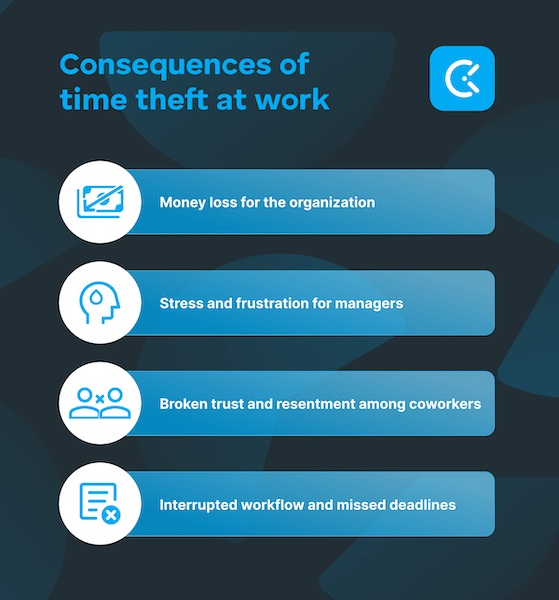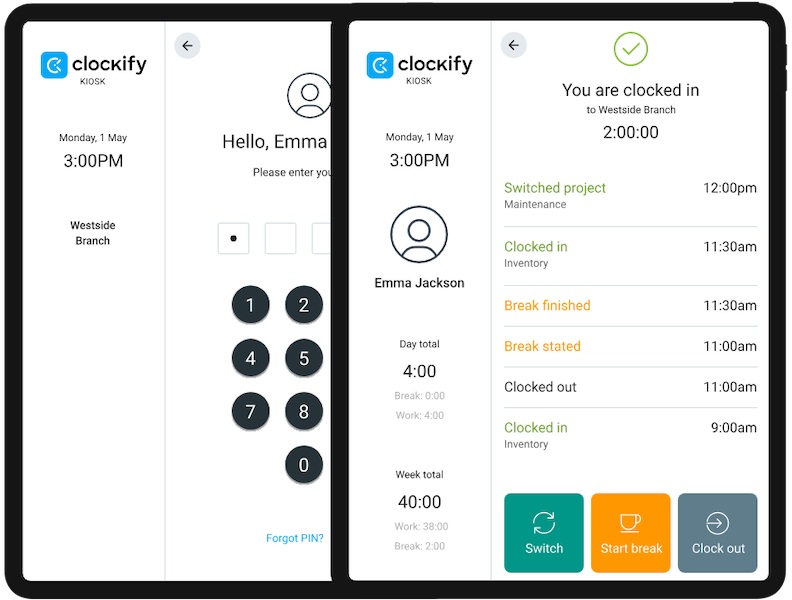Have you ever spotted a time thief among your employees but didn’t know what to do about them?
I was very confused and shocked when this happened to me last summer. Who would have thought I’d have much bigger concerns than a faulty air con in the office during a heat wave?
I’m not talking about the complex world of Doctor Who here, but a common work issue — time theft.
This problem chips away at productivity, eats into profits, and creates a culture of dishonesty.
And the real kicker? It’s happening in workplaces everywhere.

You won’t find time theft in a crime novel — so what is it?
Time theft is a workplace issue where employees don’t work when they’re supposed to — but they still get paid for those work hours.
Stealing company time is more than sneaking in a couple of extra minutes to round up the hours for random projects — it’s a huge problem for managers. Unfortunately, I witnessed just how much firsthand.
For illustration, I saw many different types of time theft, like:
- Excessive socializing — when employees spend too much time chatting instead of working,
- Extended coffee/lunch breaks — when workers take more time than appropriate for these activities,
- Buddy punching — when one coworker clocks in for another who may be running late,
- Personal tasks during work hours — when employees manage their private errands when they should be managing company projects,
- Unauthorized overtime — when workers log extra hours even though no additional work was done, and
- Misreported hours — when employees report a full work day in their timesheet yet leave the work early or come in late.
But I was relieved to learn that I wasn’t the only one dealing with this mess.
CMO at an office rental company, Teresha Aird, opened up about a time theft situation at her company. She noticed anomalies with time reports for different projects, even though some were quite subtle:

“We first noticed signs of time theft through irregularities in productivity metrics and discrepancies in time logging. It wasn’t always blatant — sometimes it was as subtle as consistent, minor overestimations of the time it would take to do tasks, or regular extended breaks.”
These examples may seem negligible, but stealing company time adds up. It can end up costing your company thousands of dollars each year.
But that’s not the end of it. Let me explain what issues were in store for us.
💡 Clockify Pro Tip
Learn how to identify wasting time and inefficiency at work so that you can take proper steps to address those issues and improve productivity:
What could time theft do to your organization?
News flash: time theft affects your company’s bottom line.
When I put everything on paper, I got some startling results. Namely, if every single employee in a 100-person company I worked at snatched just 15 minutes every day, that would yield 25 wasted hours of work a week that were still paid for.
It was clear as day — every time my employees got paid for the time they didn’t actually spend working, my company lost money.
Ouch.
Let’s not forget the stress and frustration we, as managers, face in this situation. Constantly worrying about whether your team is stealing time or actually working can take a huge toll on your well-being. If I wanted to play detective, I would have become one in the first place, right?
The impact on team morale is another issue related to time theft at work.
When honest employees see their colleagues constantly getting away with slacking off, resentment creeps in. This could lead to:
- Broken trust,
- Subpar teamwork, and
- Drop in motivation and productivity.
Time theft also disrupts the entire organizational workflow.
With my perceptive abilities turned to the maximum, I noticed that if just one person on my team slacked off, the other members would have to cover for them. Over time, this affected work quality and led to missed deadlines and — what I feared most — strained coworker relationships.
That’s why I had to come up with ways to prevent time theft.
So I did.
💡 Clockify Pro Tip
Discover the most frequent time management challenges together with simple ways to fix them:

How to prevent and manage time theft?
To prevent time theft at work, I established clear expectations to foster accountability among my employees. Also, I ensured everyone understood honesty and responsibility are valued.
For some practical ways to prevent time theft, I decided to:
- Set clear break times so that every employee knows exactly how long they have before they need to resume work, and
- Use time tracking software to make tracking work hours easier and transparent.
For deeper insight, I spoke to a fellow leader.
People and Culture Manager Jessica Munday explained that adequate training and resources, as well as incentives, make a big difference:

“Our ultimate goal is to create a work environment where time theft is not only monitored and controlled but also largely prevented via the use of supportive management strategies and an enjoyable work environment.”
Still, what if you’re dealing with repeat offenders? In that case, try the following strategies:
- Additional training in better workload and time management for workers who are tempted to steal time due to a lack of organizational skills, and
- Disciplinary actions that you deem adequate for workers who continue to commit time theft even after training and warnings.
Of course, I was aware that no policy or training speaks louder than my own actions as a manager.
So, do your best to always show up on time, stick to the set break schedule, and track your work hours transparently.
💡 Clockify Pro Tip
Start tracking attendance and get valuable data for reports and payroll by using a simple-to-master time clock tool:
The ultimate (and obvious) solution for time theft
A workspace where everyone knows their time is valued creates a more positive and productive work environment. Team members collaborate and trust each other, and projects are completed promptly and with care. It’s a sure win-win!
Believe me — measures to prevent time theft aren’t and shouldn’t ever be a form of employee punishment. Yes, you’ll save the company’s money, but you’ll also create a solid foundation for a rewarding company culture.
The key is for everyone — managers and employees — to feel safe at their place of work.
This wasn’t an easy feat, but I soon realized I didn’t have to do it alone. Instead, I came across Clockify.
As a no-nonsense time tracker, Clockify greatly contributed to my success in preventing time theft. With automatic time tracking, I could easily monitor work hours and take the guesswork out of time management.

As a powerful yet affordable time tracking software, Clockify lets you:
- Track time via kiosk, timer, or a timesheet,
- Keep tabs on daily attendance and overtime,
- Plan out your projects and resources, and
- Get reports on where the time goes.
Thanks to Clockify, I eliminated time theft and created a happy, fair, and efficient work environment for everyone. Oh, and I got the AC fixed soon enough.
Don’t wait to turn every minute into a moment of productivity.



